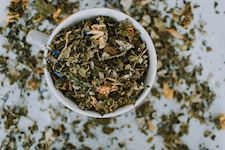Culinary Herbs - Endorsed Certificate Course (TQUK - Training Qualifications UK)
Distance learning course with study materials, tutor support and final exam included
Academy For Distance Learning
Summary
- Exam(s) / assessment(s) is included in price
- Tutor is available to students
Add to basket or enquire
Overview
Culinary Herbs Lone Course.100 Hours Endorsed Certificate Course (TQUK - Training Qualifications UK).
Master the art of growing and using herbs.! Learn how to identify and successfully grow dozens of common and uncommon edible herbs. Develop your skills and experience the delights of cooking adventurous new recipes with herbs.
Learn drying and other methods of preserving the flavour (eg. herb oils, salts, vinegars). Eight lessons as follows cover common and less common herbs used for cooking.
Benefits of an ADL Endorsed Course?
Endorsed courses are skills based. They have been evaluated and approved by an independent awarding body such as Training Qualifications UK (TQUK).
What makes ADL’s Endorsed courses different?
- Flexible Self-Paced Learning– adjust your learning around your home and work commitments
- Start and Finish at any time
- Courses globally and industry relevant
- Practical Component at the end of most lessons.
Allocated your own tutor relevant to your subject. You can have as little or as much contact as you like with your tutor. They are there to support you all the way through.
This course is endorsed by TQUK -Training Qualifications UK, an OFQUAL awarding body.
Achievement
Course media
Description
Lesson Structure:
- Introduction
- Scope and Nature of Culinary Herbs
- Herbs and Horticulture
- Accurately Identifying Herbs
- Plant Classification, binomial system
- Finding the group a herb fits into -Monocotyledons and Dicotyledons, Plant Families
- Pronouncing Plant Name
- Resources – information contacts (ie. nurseries, seed, clubs etc.
- Culture
- Overview
- Soils
- pH Requirements
- Improving soild
- Potting mixes
- Plant Nutrition and Fertilizers
- Water Management for Herbs
- Diagnosing Plant Health Problems
- Pests, Disease and Environmental Problems
- Planting, staking, and establishing herb plants, etc.
- Growing Herbs
- Propagation of herbs
- Seed Propagation
- Cutting Propagation
- Potting Media
- Division, Separation, Layering
- Rejuvenation of Perennials
- Designing a Culinary Herb Garden
- Creating a Kitchen Garden
- Planning a Fragrant Herb Garden
- Companion Planting in Your Design
- Cooking With Herbs
- General Guidelines for Using Herbs in Cooking
- Harvesting Herbs; roots, leaves, seed, fruits
- Handling after Harvest
- Drying Herbs
- Hints for Using a Range of Selected Herbs in Cooking
- Herbs For Garnish
- Herbal Teas: What & how to use different herbs
- Herb Vinegars, oils, butters, cheeses, salts, sugars, honey,, etc
- Herb Confectionary, Cakes, etc.
- Selected Herb Recipes
- Using Herbs with Fruit
- Most Commonly Grown Varieties.
- Review of many Common Culinary herbs, including their culture and culinary use
- Over 20 herbs reviewed in detail, incl. Alliums
- Many additional herbs summarized
- Other Important Groups.
- Lamiaceae (mint family) herbs
- Lemon Scented Herbs and their uses
- Hyssop
- Mints
- Bergamot
- The Basils
- Origanum species
- Rosemary
- Salvias
- Thymes
- Lavenders
- The Lesser Grown Varieties
- Agastache
- Agrimony
- Visnaga
- Apium
- Arctium lappa
- Bundium
- Capparis; and many more
- Using Australian Native Plants as Flavourings
- Special Assignment
- A PBL Project on a selected genus of culinary herbs
Each lesson culminates in an assignment which is submitted to the academy, marked by the academy's tutors and returned to you with feedback, any relevant suggestions, comments, and if necessary, extra reading.
Who is this course for?
Herbalists, Cooking Enthusiasts, Chefs
Requirements
A pc or laptop with internet connection.
Career path
An herbalist uses a variety of plants to foster health and healing. Many herbalists are also licensed practitioners of other disciplines, such as acupuncture, naturopathy, or traditional Chinese medicine.
Questions and answers
Currently there are no Q&As for this course. Be the first to ask a question.
Reviews
Currently there are no reviews for this course. Be the first to leave a review.
Legal information
This course is advertised on reed.co.uk by the Course Provider, whose terms and conditions apply. Purchases are made directly from the Course Provider, and as such, content and materials are supplied by the Course Provider directly. Reed is acting as agent and not reseller in relation to this course. Reed's only responsibility is to facilitate your payment for the course. It is your responsibility to review and agree to the Course Provider's terms and conditions and satisfy yourself as to the suitability of the course you intend to purchase. Reed will not have any responsibility for the content of the course and/or associated materials.





